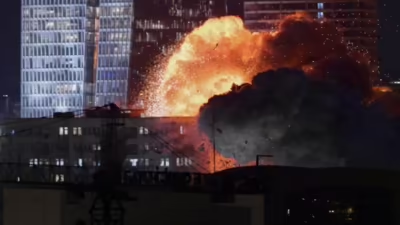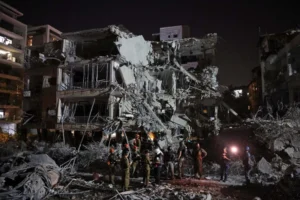Iran launches massive missile attack against Israel today, creating one of the most dangerous moments in recent Middle Eastern history. Air raid sirens blared across Israeli cities while explosions rocked major population centers. This attack represents Iran’s direct response to recent Israeli military actions.
The situation developed rapidly throughout the day. Iranian forces fired dozens of ballistic missiles toward Israeli territory. Most projectiles targeted military installations, though some struck near civilian areas.
Iran launches massive missile: Timeline of today’s events
Several key moments shaped this crisis:
- Early morning: Iranian officials announced retaliation plans
- Midday: First wave of missiles launched from Iranian territory
- Afternoon: Israeli defense systems activated across the country
- Evening: Explosions reported in multiple Israeli cities
Israeli citizens received emergency alerts on their phones. Many rushed to bomb shelters as sirens wailed throughout major metropolitan areas. The Iron Dome defense system intercepted numerous incoming projectiles.
Why Iran decided to attack
Iran’s military leaders cited several reasons for their missile strikes. They claimed Israel had crossed “red lines” through recent operations. Iranian officials specifically mentioned attacks on their regional allies as justification.
The Islamic Revolutionary Guard Corps issued statements before the attack. They warned that Iran would defend its interests against what they called Israeli aggression. This escalation follows months of rising tensions between both nations.
Regional experts had predicted this type of confrontation. Iran has threatened retaliation for weeks following specific Israeli military operations. Today’s attack fulfills those earlier warnings.
Iran launches massive missile: Israel’s response to the missile barrage
Israeli military forces immediately activated their defense protocols. The Iron Dome system engaged multiple incoming threats over populated areas. Military officials reported successful interceptions of many Iranian missiles.
Prime Minister Benjamin Netanyahu convened emergency security meetings. Israeli leaders promised a strong response to what they termed an unprovoked attack. Military commanders began planning potential counter-strikes against Iranian targets.
Israeli hospitals prepared for potential casualties. Emergency services positioned ambulances throughout major cities. Fortunately, initial reports suggest limited civilian injuries despite the scale of the attack.
International reaction to the conflict
World leaders quickly condemned Iran’s missile strikes. Several countries called for immediate de-escalation between both nations. The United Nations Security Council scheduled an emergency session to address the crisis.
Key international responses included:
- United States: Pledged support for Israeli defence
- European Union: Called for restraint from all parties
- Arab League: Expressed concern about regional stability
Many nations worried about broader regional implications. Oil prices jumped significantly following news of the attack. Stock markets across the globe experienced volatility due to the uncertainty.
Iran launches massive missile: What this means for regional stability
This missile exchange could trigger a wider Middle Eastern conflict. Iran has powerful allies throughout the region who might join future fighting. Israel possesses advanced military capabilities that could devastate Iranian infrastructure.
Both countries have avoided direct confrontation for decades. Today’s events mark a significant departure from previous proxy conflicts. The situation requires careful diplomatic intervention to prevent further escalation.
Regional civilians face the greatest risks from continued fighting. Millions of people live within range of both nations’ missile systems. Economic disruption could affect global energy supplies if the conflict spreads.
Looking ahead: Potential consequences
Several scenarios could emerge from today’s events. Iran might launch additional strikes if Israel retaliates strongly. Alternatively, diplomatic pressure could encourage both sides to step back from the brink.
The coming days will prove critical for regional peace. International mediators must work quickly to prevent further military exchanges. Both Iran’s leadership plus Israeli officials need to consider the broader implications of continued fighting.
Citizens in both countries deserve to live without fear of missile attacks. The international community must pressure all parties toward a peaceful resolution of their differences through diplomatic channels rather than military strikes.








Be First to Comment